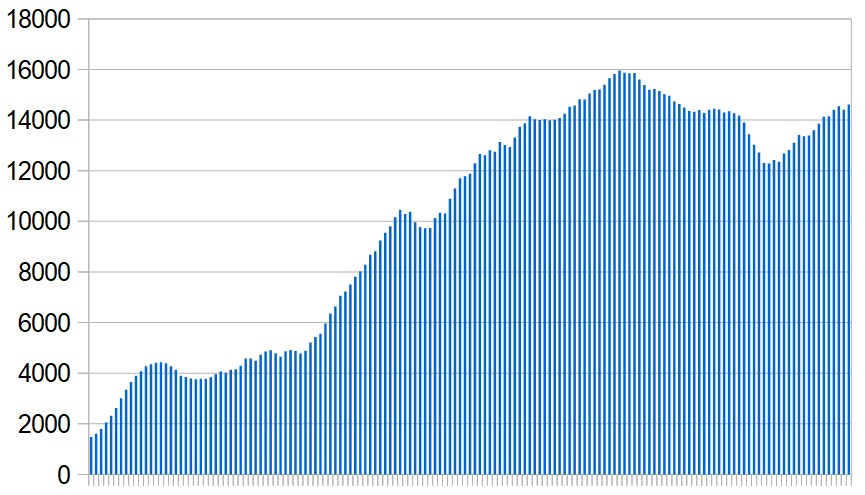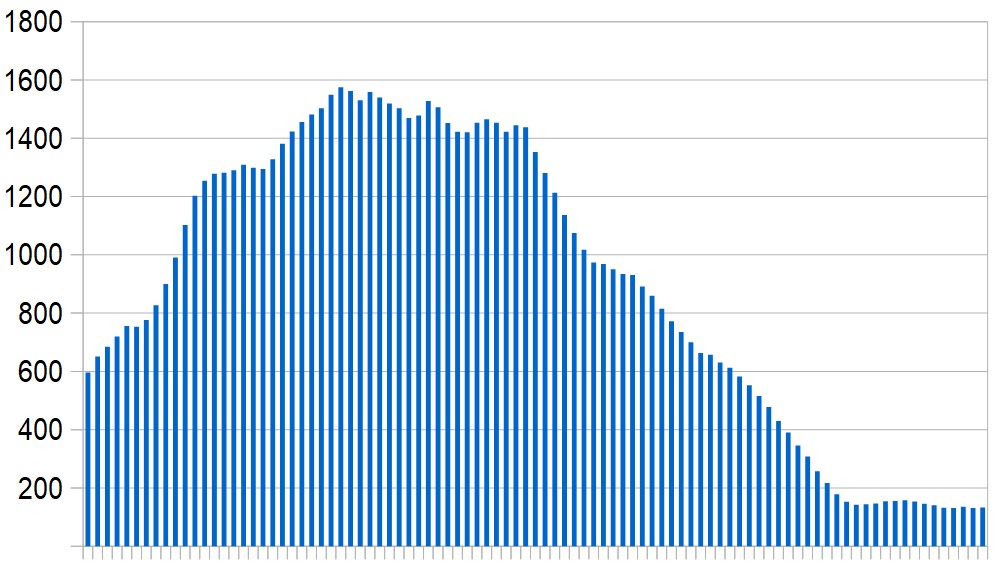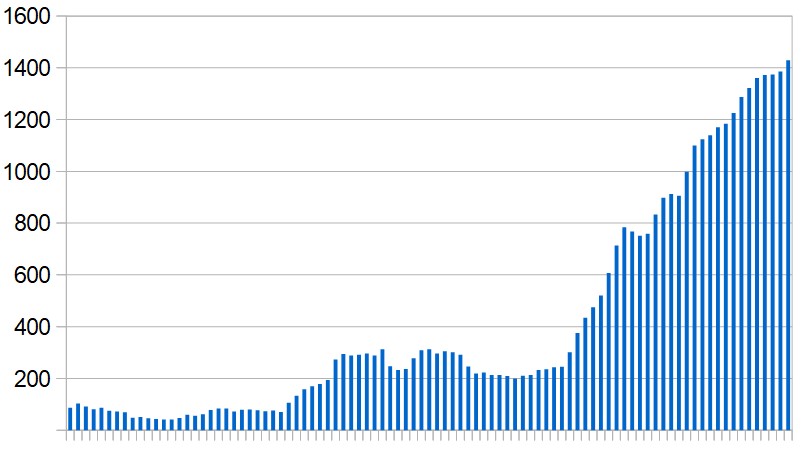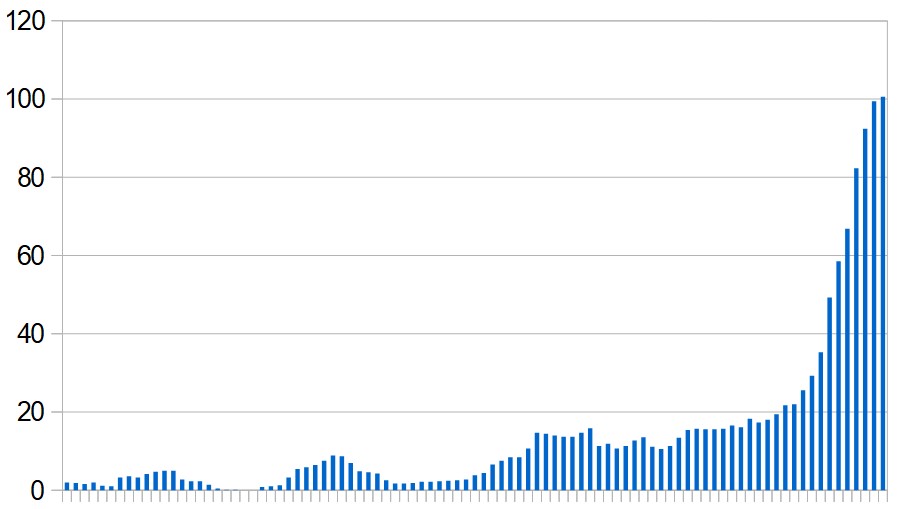Week ending 22 August 2020
REGIONAL OVERVIEW
 |
The Middle East and North Africa has seen an overall rise in Covid-19 infections during the past week, with an average of 14,600 new cases reported each day. This is still some way below the peak of almost 16,000 a day recorded in the first week of July.
Among the 20 countries monitored, Algeria, Egypt, Israel, Kuwait, Oman, Qatar and Saudi Arabia reported a modest improvement compared with the week before.
Iraq continues to report the highest number of new infections in the region, with an average of more than 4,000 new cases a day. There are also thought to be large numbers of unreported cases in Iraq.
Jordan, Lebanon, Morocco, Syria and Tunisia have seen some alarming increases, though the outbreaks in those countries are still relatively small.
Detailed statistics for the region, based on official figures, can be found in this spreadsheet.
Previous situation reports:
August 15; August 8; August 1; July 25; July 18; July 11; July 4; June 27; June 20.
ALGERIA
Algeria's outbreak peaked towards the end of July when more than 600 new cases were being recorded each day. Since then the trend has been downwards, with new cases averaging 429 a day during the past week according to official figures.
Restrictions imposed in 29 of Algeria's 58 wilayas (administrative districts) were eased last week but there is still a night curfew (11pm to 6am) and face masks must be worn outdoors.
Large mosques (1,000-plus capacity) have been alllowed to open throughout the country but worshippers must bring their own prayer mats and wear face masks. Congregational prayers on Fridays are still banned.
About 4,025 medical staff have been infected with Covid-19 in Algeria and 69 of them have died, according to the government's scientific committee. These figures are a lot higher than those previously given by the health minister.
For more information see: Covid-19 in Algeria
Confirmed cases: 40,667
New cases in past week: 3,003
Active cases: 10,662
Deaths: 1,418
Tests carried out: (unknown)
BAHRAIN
Bahrain has more than 26,000 known cases per million inhabitants. This makes it the world's third most infected country after Qatar and French Guiana. However, Bahrain is also one of the world leaders in Covid-19 testing. So far, almost 60% of its 1.7 million population have been tested.
The daily total of new cases fluctuates but Bahrain's epidemic appears to be subsiding gradually. The number of people reported to be currently infected is around 3,300 compared with 5,700 at the peak in mid-June.
Cafes and restaurants remain closed but the authorities have announced plans for a phased reopening in September.
Bahrain no longer requires people arriving in the country to isolate themselves. In recent tests only 0.2% of new arrivals were found to carry the virus.
For more information see: Covid-19 in Bahrain
Confirmed cases: 48,661
New cases in past week: 2,609
Active cases: 3,314
Deaths: 181
Tests carried out: 1 million
EGYPT
 |
New cases peaked in June and have been falling sharply during the past few weeks, according to official figures. This week's average was 123 cases a day compared with almost 1,600 at the peak.
Although Egypt's official figures have often been viewed with suspicion there is other evidence that its outbreak is subsiding. For example, the health ministry has been closing down some of its temporary isolation facilities.
Egypt has been anxious to revive its economically important tourism sector and in July it began reopening its seaside resorts for foreign visitors. These resorts – in South Sinai, the Red Sea and Marsa Matrouh on the Mediterranean coast – have been isolated from the rest of the country to reduce the risk of infections spreading. Foreigners flying directly to the resorts don't need to be tested for Covid-19 but they will need a test if they wish to leave the resort and visit other parts of the country. Foreigners arriving in other parts of the country must have tested negative during the 72 hours before travelling and will not be allowed to visit the resorts.
For more information see: Covid-19 in Egypt
Confirmed cases: 97,148
New cases in past week: 928
Active cases: 27,599
Deaths: 5,231
Tests carried out: 135,000
IRAN
Iran was the first country in the region to be seriously affected by the virus and its epidemic shows no sign of abating. Government figures show an initial wave of infections which peaked at the end of March. It subsided during April, briefly dipping below 1,000 new cases per day but then rose to a new peak in the first week of June.
New cases this week averaged 2,206 a day – virtually unchanged from the previous week.
Iran continues to report more coronavirus-related deaths than any other country in the region. A further 1,045 deaths have been recorded during the past week.
Confirmed cases: 354,7645
New cases in past week: 15,939
Active cases: 28,522
Deaths: 20,376
Tests carried out: 3 million
IRAQ
Iraq is currently recording more new infections than any other country in the region. New cases this week averaged more than 4,000 a day and Wednesday's total of 4,576 cases was the highest since the outbreak began. Worse still, Iraq's official figures are widely believed to understate the scale of the epidemic. Many cases go unreported because of social stigma. Compliance with preventive measures appears to be low and health services are inadequate.
For more information see: Covid-19 in Iraq
Confirmed cases: 197,085
New cases in past week: 28,795
Active cases: 50,356
Deaths: 6,283
Tests carried out: 1.4 million
ISRAEL
After coming close to bringing the epidemic under control, Israel has been hit by a second wave much larger than the first. The first wave peaked at around 600 new cases a day in early April. Efforts to control it were intially successful and by the second half of May new cases had dropped to about 15 a day.
However, the virus surged back when lockdown restrictions were lifted and by the end of July new cases were averaging almost 1,800 a day. The second wave now appears to have peaked but the number of new cases remains high, averaging 1,377 a day this week.
For more information see: Covid-19 in Israel
Confirmed cases: 100,716
New cases in past week: 9,636
Active cases: 22,122
Deaths: 809
Tests carried out: 2.2 million
JORDAN
Until a couple of weeks ago Jordan appeared to be the most successful Arab country in controlling the virus. Although it continued to intercept new cases among people arriving from abroad, transmission within the country had virtually ceased. Since then, however, there has been a spate of locally-occurring cases and they now account for most of the newly-detected infections.
The recent problems began with an outbreak at the Jaber-Nasib crossing point on the border with Syria where at least nine employees were diagnosed with the virus (see news report). This led to further infections among their contacts in various other places.
Buildings in several cities have been sealed off but but tracing contacts and ensuring compliance with quarantine is proving a formidable task. One of the people who tested positive for the virus this week is said to have come into contact with 170 people and visited 35 different places all over the country.
At a news conference on Friday health minister Saad Jaber said the main reason for the increase in infections is non-compliance with preventive measures at border crossings. Employees had broken the rules to meet for tea, coffee and tomato stir-fry, he added. Even people who had tested positive were shaking hands and hosting large gatherings.
New measures may be imposed in the light of developments over the next few days. These could include a one-day lockdown on Fridays, extending curfew hours and temporarily closing schools, mosques, churches, parks and gathering places.
For more information see: Covid-19 in Jordan
Confirmed cases: 1,532
New cases in past week: 203
Active cases: 259
Deaths: 11
Tests carried out: 728,000
KUWAIT
New infections peaked in late May at just over 1,000 cases a day. The numbers have dropped back substantially since then and this week's average was 583 a day.
The government has announced that the night curfew will be lifted on August 30. Restrictions on large gatherings such as weddings and funerals will continue.
As a result of the economic downturn caused by the pandemic and low oil prices Kuwait is planning to expel 360,000 foreigners though as yet there is no timetable for their departure.
For more information see: Covid-19 in Kuwait
Confirmed cases: 79,269
New cases in past week: 4,084
Active cases: 7,494
Deaths: 511
Tests carried out: 581,000
LEBANON
Political and economic turmoil, plus the devastating explosion in Beirut on August 4, have diverted attention from the coronavirus. Although Lebanon's outbreak is still relatively small, infections have surged during the past month. New cases this week averaged 505 a day – about three times as many as at the end of July.
A new partial lockdown began on Friday and is due to last two weeks. However, there are doubts about how well it will be observed or enforced (see news report).
For more information see: Covid-19 in Lebanon
Confirmed cases: 11,580
New cases in past week: 3,535
Active cases: 8,260
Deaths: 116
Tests carried out: 451,000
LIBYA
Libya is in its ninth year of internal conflict. The UN-backed Government of National Unity in Tripoli is challenged by Field Marshall Haftar's forces based in the east of the country. There are also numerous militias. This leaves the country ill-equipped to cope with a major epidemic.
Growing levels of insecurity, political fragmentation and weak governance have led to a deterioration of basic services, particularly in the health system. At least 27 health facilities have been damaged or closed by fighting and some have been attacked directly. There are 870,000 people – refugees, asylum seekers and displaced persons – who the UN regards as especially vulnerable.
The World Health Organisation (WHO) describes the coronavirus situation in Libya as "clusters of cases" – in other words, a series of local outbreaks rather than a generalised epidemic. Sebha, Tripoli, Zliten, Misrata, Ashshatti, Ubari, Traghen, Janzour and Khoms are said to be particular hotspots.
Testing is very limited and the number of confirmed infections is still relatively small but growing fast. Half of the known cases were recorded this month.
Investigations by the National Centre for Disease Control (NCDC) have concluded that most infections are the result of people not practising social distancing. The Libya Herald reports that most people do not wear masks in public. It adds: "Many still spend the weekend with their parents/relatives, attend funerals, baby-parties, and weddings. And although function halls have been forced to shut down, many are holding events for hundreds in open locations such as farms."
The authorities in Tripoli have responded by announcing series of penalty charges, including fines of 250 dinars ($180) for not wearing a face mask on public transport and 500 dinars (plus temporary closure) for businesses that fail to enforce mask-wearing.
For more information see: Covid-19 in Libya
Confirmed cases: 10,121
New cases in past week: 2,794
Active cases: 8,888
Deaths: 180
Tests carried out: 91,000
MOROCCO
 |
Coronavirus infections have been rising sharply in Morocco over the last few weeks, with a record 1,776 new cases reported on Sunday.
This is a major setback since early June when a strict lockdown had reduced new cases to around 40 a day. Local health experts attribute the reversal mainly to the "rushed" way restrictions were lifted (see news report).
There are scattered outbreaks around the country which could grow rapidly if not monitored closely. Containing these depends heavily on the effectiveness of contact-tracing – which is being hampered by delays in testing. Once someone has been diagnosed with Covid-19, it usually takes a week or more to trace all their contacts – by which time the virus may have spread further.
Delays in testing are also being blamed for causing avoidable deaths, because people with serious symptoms are often not receiving treatment until it is too late.
For more information see: Covid-19 in Morocco
Confirmed cases: 49,247
New cases in past week: 10,006
Active cases: 14,239
Deaths: 817
Tests carried out: 1.7 million
OMAN
Infections peaked in mid-July with just under 1,600 cases a day and are now on a downward path. New cases averaged 147 a day this week – a substantial drop to levels not seen since early May.
This week the authorities issued a long list of rules for people visiting restaurants and cafes.
More than 600 medical staff in Oman have been infected with Covid-19 since the outbreak began, according to the government.
For more information see: Covid-19 in Oman
Confirmed cases: 83,769
New cases in past week: 1,026
Active cases: 4,774
Deaths: 609
Tests carried out: 309,000
PALESTINE
Palestine, like Israel, is in the midst of a wave of new infections. Hebron is the most seriously affected area, with 10,832 confirmed cases – almost half the total.
New cases this week averaged 477 a day – a small increase on the previous week.
Many of the infections are attributed to people ignoring the rules for social distancing, which the authorities have difficulty enforcing. The health ministry says more than 30% of cases are the result of Palestinians travelling to and from work in Israel which is in the second wave of its epidemic.
Fears of a major outbreak in Gaza have not materialised. Most of the known cases there appear to have been due to contacts with Egypt.
For more information see: Covid-19 in Palestine
Confirmed cases: 24,398 (West Bank 16,293, Gaza 117, East Jerusalem 7,988)
New cases in past week: 3,342
Active cases: 8,993
Deaths: 135
Tests carried out: 214,000
QATAR
In population terms Qatar has more known cases than any other country – 41,000 per million inhabitants. Migrant workers have been disproportionately affected. Qatar's epidemic reached a peak in the first week of June but infections have fallen since then. New cases this week averaged 278 a day – well below the peak of more than 1,800 a day.
For more information see: Covid-19 in Qatar
Confirmed cases: 116,481
New cases in past week: 1,949
Active cases: 3,072
Deaths: 193
Tests carried out: 577,000
SAUDI ARABIA
Saudi Arabia has the largest number of recorded cases among the Arab countries. New infections reached an initial peak in the fourth week of May, then dropped back slightly before rising to a higher peak in the third week of June. Since then, though, there has been a substantial improvement.
Numbers of new cases are still large. This week they averaged 1,326 a day – a small drop since the previous week and about 3,000 a day below the June peak. The kingdom currently has fewer than 25,000 active cases compared with more than 63,000 at the peak.
Migrant workers have been disproportionately affected but the authorities have also complained about non-compliance with precautionary measures by Saudi citizens.
For more information see: Covid-19 in Saudi Arabia
Confirmed cases: 305,186
New cases in past week: 9,284
Active cases: 24,539
Deaths: 3,580
Tests carried out: 4.5 million
SUDAN
The coronavirus struck Sudan in the midst of a political transition following a popular uprising against the regime of President Bashir and the country is ill-equipped to cope with a major epidemic. Testing is very limited and official figures don't reflect the full scale of the outbreak.
For more information see: Covid-19 in Sudan
Confirmed cases: 12,623
New cases in past week: 461
Active cases: 5,335
Deaths: 812
Tests carried out: (unknown)
SYRIA
According to official figures Syria's outbreak is still small, with just over 2,000 cases reported in areas controlled by the Assad regime. Even so, that is twice as many as two weeks ago.
Official announcements rarely give any details and this lack of transparency fuels suspicions that many cases are being concealed. There is also some evidence that people with Covid-19 symptoms are reluctant to contact the authorities.
Anecdotal evidence suggests community transmission of the virus is now widespread and one study indicates there may be tens of thousands of unreported cases.
Fears have been raised about north-western and north-eastern parts of the country which are outside the regime's control. Millions of displaced people are living in those areas and health services are often rudimentary. So far, 225 cases have been confirmed in the north-east and 54 in the north-west according to Syria in Context, a subscription website.
For more information see: Covid-19 in Syria
The following figures relate to regime-controlled areas only:
Confirmed cases: 2,073
New cases in past week: 558
Active cases: 1,515
Deaths: 83
Tests carried out: (unknown)
TUNISIA
 |
Tunisia's outbreak remains small, with fewer than 3,000 infections recorded so far. New cases are growing rapidly though. This week they averaged 101 a day, compared with only 35 in the previous week.
In June, Tunisia appeared to be almost free of the virus and began promoting itself as a safe holiday destination. Tourists were to be allowed in with just a simple temperature check.
On Wednesday, however, the authorities announced that people arriving in the country must present evidence of a negative RT-PCR test result. This applies to everyone, including those arriving from low-risk countries.
A controversial LGBT+ film festival, originally due to have been held in Tunis last March, has now been postponed for a second time because of the Covid-19 outbreak. The first such festival was held in secret in 2018 because of local opposition.
For more information see: Covid-19 in Tunisia
Confirmed cases: 2,607
New cases in past week: 704
Active cases: 1,123
Deaths: 64
Tests carried out: 119,000
UNITED ARAB EMIRATES
The UAE's epidemic peaked in the last week of May when new infections were running at more than 900 a day. Numbers of new cases are now considerably lower, though this week's average of 339 a day is the highest for a month.
The UAE has carried out more tests per head of population than any other Arab country and ranks tenth worldwide in terms of levels of testing.
For more information see: Covid-19 in the UAE
Confirmed cases: 66,193
New cases in past week: 2,374
Active cases: 7,527
Deaths: 370
Tests carried out: 6.3 million
YEMEN
Because of the ongoing war, Yemen already faced a humanitarian crisis before the coronavirus arrived. Millions are malnourished and vulnerable to disease, and health services are inadequate. Official figures grossly understate the severity of the epidemic. Cholera is also prevalent.
For more information see: Covid-19 in Yemen
Confirmed cases: 1,910
New cases in past week: 48
Active cases: 306
Deaths: 543
Tests carried out: (unknown)

 RSS Feed
RSS Feed
